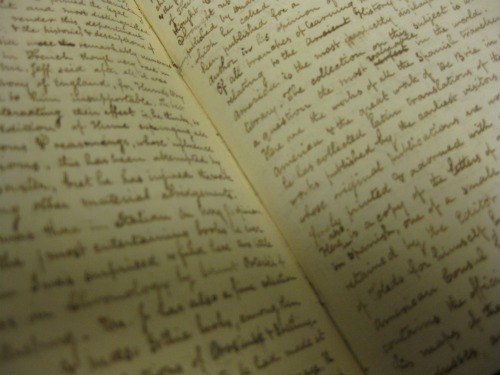On this day in 1800, Congress approved the creation of the Library of Congress (here’s the birthday blog post from the Library of Congress Blog). By 1814, the collection numbered some 3,000 volumes, many of which burned when the British army invaded the capital city in in August.
On 30 January 1815, Congress and President James Madison turned to former President Thomas Jefferson to help rebuild the library’s collection. Jefferson was offered $23,950 for his Monticello library of 6,487 volumes.
That very week, on February 3rd, Francis Calley Gray and George Ticknor arrived at Monticello to pay a visit of a few days to their friend Mr. Jefferson—a visit which Mr. Gray meticulously recorded in his diary, which we hold here at the RBMSCL.

The morning after a welcoming dinner—complete with silver goblets engraved “from G.W. to T.J.”—Mr. Jefferson had prepared a special treat for his guests, both bibliophiles and collectors. As Gray wrote in his diary:
Mr. Jefferson gave me the catalogue of his books to examine + soon after conducted us to his library, + passed an hour there in pointing out to us its principal treasures. His collection of ancient classics was complete as to the authors but very careless in the editions. They were generally interleaved with the best English Translations. The Ancient English authors were also all here + some very rare editions of them. a black letter Chaucer + the first of Milton’s Paradise Lost divided into ten books were the most remarkable. . . . Of all branches of learning however relating to the History of North + South America is the most perfectly displayed in this library. The collection on this subject is without a question the most valuable in the world. Here are the works of all the Spanish [travelers?] in America + the great work of De Brie in which he has collected latin translations of the smaller works published by the earliest visitors of America whose original publications are now lost. It is finely printed + adorned with many plates. Here also is a copy of the letters of Fernando Cortes in Spanish, one of a small edition, + the copy retained by the Editor the Cardinal Archbishop of Toledo for himself, but given by him to the American Consul for Mr. Jefferson.
On February 27, following his friends’ departure, Mr. Jefferson wrote to bookdealer Joseph Milligan (letter provided by the Library of Congress) to request his assistance in transporting the entire collection to Washington, D.C. These 6,487 books, some of which Mr. Gray had the good fortune to see, now belonged to the American people.
Sadly, an 1851 fire destroyed much of the Library of Congress’ collection, including two-thirds of Jefferson’s library. Which prompts us to remind everyone that MayDay is coming!
Thanks to Crystal Reinhardt, University Archives Graduate Student Assistant, for helping with this post.

